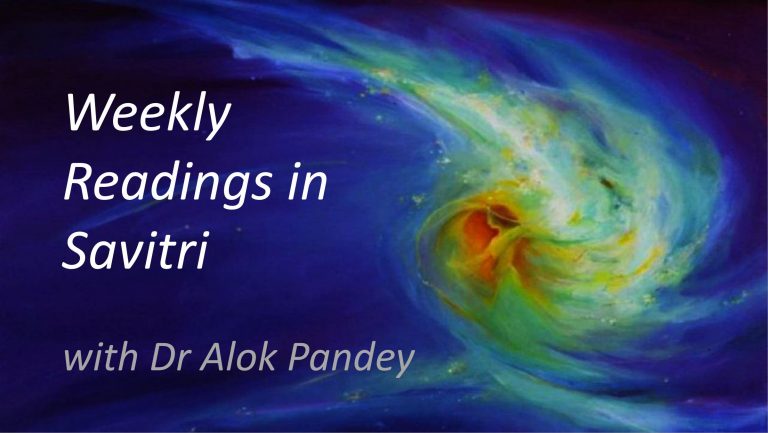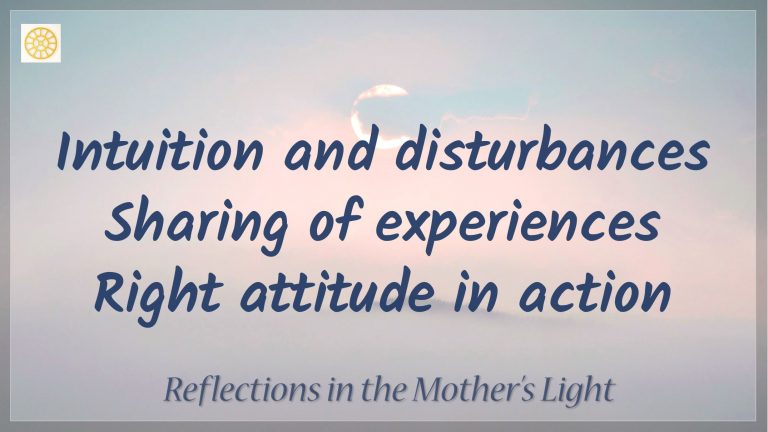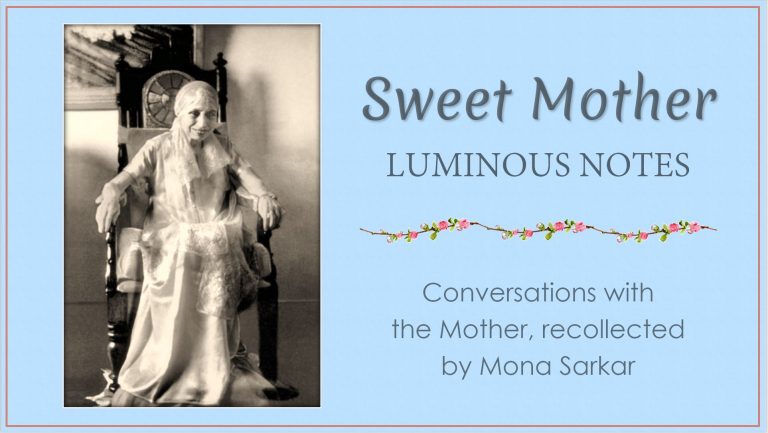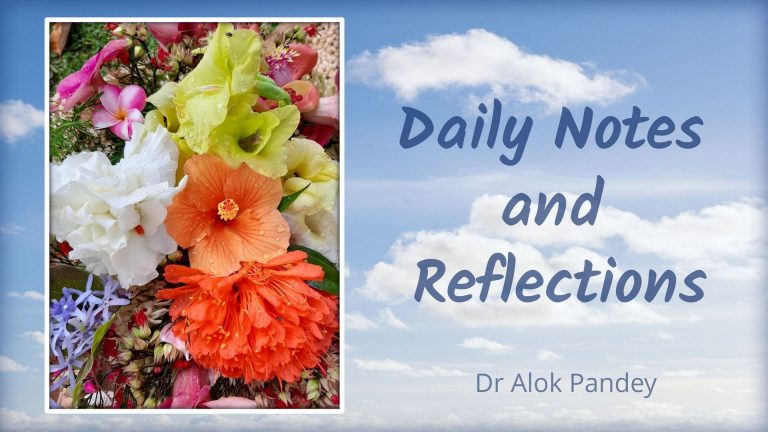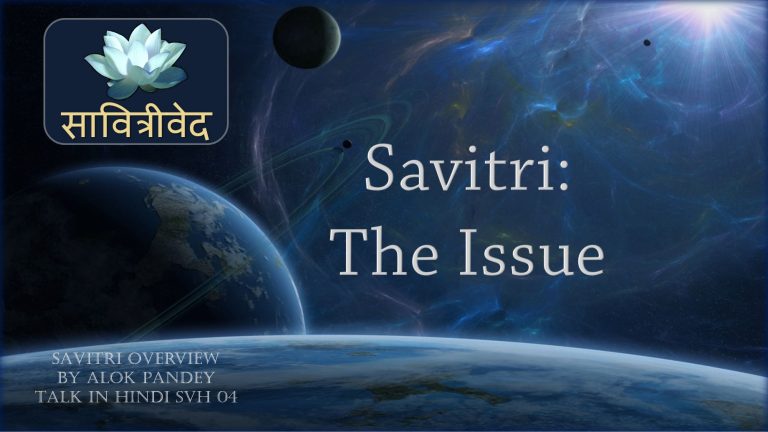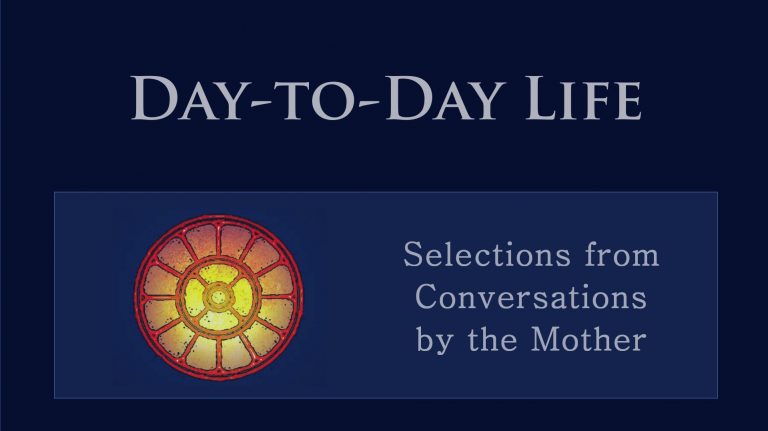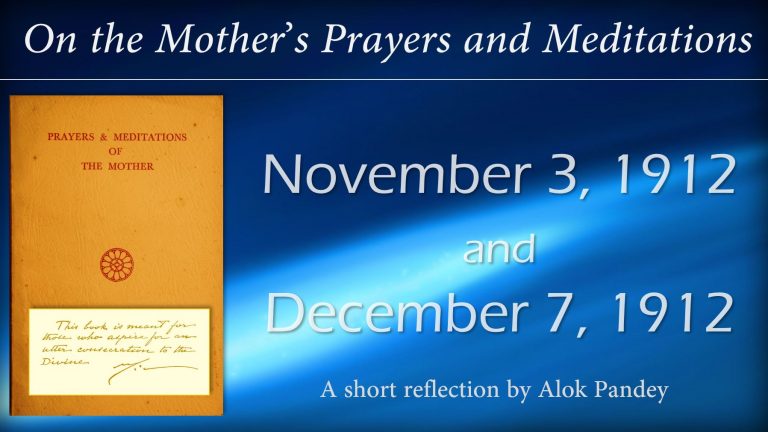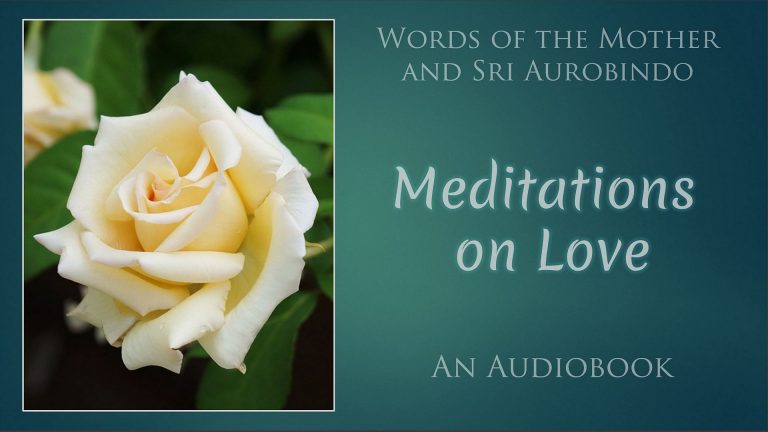Daily Offerings
He mounted burning like a cone of fire
The Silence was his sole companion left.
Impassive he lived immune from earthly hopes,
A figure in the ineffable Witness’ shrine
Pacing the vast cathedral of his thoughts
Under its arches dim with infinity
And heavenward brooding of invisible wings.
A call was on him from intangible heights;
Indifferent to the little outpost Mind,
He dwelt in the wideness of the Eternal’s reign.
His being now exceeded thinkable Space,
His boundless thought was neighbour to cosmic sight:
A universal light was in his eyes,
A golden influx flowed through heart and brain;
A Force came down into his mortal limbs,
A current from eternal seas of Bliss;
He felt the invasion and the nameless joy.
Aware of his occult omnipotent Source,
Allured by the omniscient Ecstasy,
A living centre of the Illimitable
Widened to equate with the world’s circumference,
He turned to his immense spiritual fate.
Abandoned on a canvas of torn air,
A picture lost in far and fading streaks,
The earth-nature’s summits sank below his feet:
He climbed to meet the infinite more above.
The Immobile’s ocean-silence saw him pass,
An arrow leaping through eternity
Suddenly shot from the tense bow of Time,
A ray returning to its parent sun.
Opponent of that glory of escape,
The black Inconscient swung its dragon tail
Lashing a slumbrous Infinite by its force
Into the deep obscurities of form:
Death lay beneath him like a gate of sleep.
One-pointed to the immaculate Delight,
Questing for God as for a splendid prey,
He mounted burning like a cone of fire.
To a few is given that godlike rare release.
Savitri: Book One Canto 5
In Thee, by Thee, all is transfigured
January 19, 1914
O Lord, divine Master of Love, Thou art the eternal victor, and those who become perfectly attuned to Thee, those who live for Thee alone and by Thee alone, cannot but win all victories; for in Thee is the supreme force, the force of complete disinterestedness, of perfect clear-sightedness, sovereign kindness.
In Thee, by Thee, all is transfigured and glorified; in Thee is found the key to all mysteries and all powers. But one can attain Thee only if one no longer desires anything except to live in Thee, serve Thee, make Thy divine work triumph more swiftly for the salvation of a greater number of men.
O Lord, Thou alone art real and all else is an illusion; for when one lives in Thee one sees and understands all things, nothing escapes Thy perfect knowledge, but everything wears another appearance; for all is Thou in essence, all being the fruit of Thy work, of Thy magnanimous intervention; and in the most sinister darkness Thou couldst kindle a star.
May our devotion grow ever deeper.
May our consecration grow ever more perfect.
And mayst Thou, already the real sovereign of life, become in effect its true sovereign.
[Prayers and Meditations of the Mother]
Two paths of Yoga
What are the dangers of Yoga? Is it especially dangerous to the people of the West? Someone has said that Yoga may be suitable for the East, but it has the effect of unbalancing the Western mind.
Yoga is not more dangerous to the people of the West than to those of the East. Everything depends upon the spirit with which you approach it. Yoga does become dangerous if you want it for your own sake, to serve a personal end. It is not dangerous, on the contrary, it is safety and security itself, if you go to it with a sense of its sacredness, always remembering that the aim is to find the Divine.
Dangers and difficulties come in when people take up Yoga not for the sake of the Divine, but because they want to acquire power and under the guise of Yoga seek to satisfy some ambition. If you cannot get rid of ambition, do not touch the thing. It is fire that burns.
There are two paths of Yoga, one of tapasyā (discipline), and the other of surrender. The path of tapasyā is arduous. Here you rely solely upon yourself, you proceed by your own strength. You ascend and achieve according to the measure of your force. There is always the danger of falling down. And once you fall, you lie broken in the abyss and there is hardly a remedy. The other path, the path of surrender, is safe and sure. It is here, however, that the Western people find their difficulty. They have been taught to fear and avoid all that threatens their personal independence. They have imbibed with their mothers’ milk the sense of individuality. And surrender means giving up all that. In other words, you may follow, as Ramakrishna says, either the path of the baby monkey or that of the baby cat. The baby monkey holds to its mother in order to be carried about and it must hold firm, otherwise if it loses its grip, it falls. On the other hand, the baby cat does not hold to its mother, but is held by the mother and has no fear nor responsibility; it has nothing to do but to let the mother hold it and cry ma ma.
If you take up this path of surrender fully and sincerely, there is no more danger or serious difficulty. The question is to be sincere. If you are not sincere, do not begin Yoga. If you were dealing in human affairs, then you could resort to deception; but in dealing with the Divine there is no possibility of deception anywhere. You can go on the Path safely when you are candid and open to the core and when your only end is to realise and attain the Divine and to be moved by the Divine.
[The Mother: CWM 3]
Songs of the Soul (2024 09 07)
Supreme Mother, Mother Divine
Maa long have we wandered along the circuitous roads of Ignorance, often circling around the same spot in the illusion of progress. Long have we been lost in the forest of Ignorance tasting the sweet-bitter fruits and drinking muddy waters from the streams of desire. Long have we been entangled in the fruitless labour of digging the hard crust of earth nature hoping to plant there the tree of Divine Love but gathering only the blooms of asphodel. Long have we tried to hear the whispers of the winds in deserts for the rhythms of the higher worlds.
Let the rejuvenating waters of Thy Divine Love pour upon this barren soil so that the womb of ignorance delivers the offspring of New Creation. Let Thy Rays smite the darkness so that the golden sunlit Path appears everywhere. May the illusions vanish and in its place grow forms luminous and and bright. May the sweet nectarous streams washing Thy Feet flow into the forest of life and the trees bear the fruits of paradise. May the soil of human nature grow plastic to Thy touch and the deathless Rose bloom and the golden harvest reaped. May the vast stretches of desert whisper Thy melodious notes in the Silence of the human night. May this earth shed her worn-out and sullied attire and wear a bright and beautiful dress consistent with her deepest truth. May our human life be transformed into the Life Divine.
Om Maa Maa Maa Maa Maa Maa Maa
The Word of Infinity
Our limited receptivity is one issue when we turn towards Sri Aurobindo’s words. There is another issue that arises from the vast and complex nature of the Truth he brings to earth and man. The Supramental Truth is the truth of the Infinite. It cannot be bound or limited by any one-sided formula or understanding of things. Nor even can it be bound by any process or technique for which we may be eagerly looking for. Sri Aurobindo would rather give us the fundamental understanding of how things are and work. He leaves the rest to be adapted by each individual given his or her evolutionary stage. As he points out in the Synthesis itself about the workings of the Divine Shakti:
“In the first place it does not act according to a fixed system and succession as in the specialised methods of Yoga, but with a sort of free, scattered and yet gradually intensive and purposeful working determined by the temperament of the individual in whom it operates, the helpful materials which his nature offers and the obstacles which it presents to purification and perfection. In a sense, therefore, each man in this path has his own method of Yoga. Yet are there certain broad lines of working common to all which enable us to construct not indeed a routine system, but yet some kind of Shastra or scientific method of the synthetic Yoga….
What is his method and his system? He has no method and every method. His system is a natural organisation of the highest processes and movements of which the nature is capable. Applying themselves even to the pettiest details and to the actions the most insignificant in their appearance with as much care and thoroughness as to the greatest, they in the end lift all into the Light and transform all. For in his Yoga there is nothing too small to be used and nothing too great to be attempted. As the servant and disciple of the Master has no business with pride or egoism because all is done for him from above, so also he has no right to despond because of his personal deficiencies or the stumblings of his nature. For the Force that works in him is impersonal—or superpersonal—and infinite.” [CWSA 23: Pp. 46 – 47, 61 – 62]
Or else he would give us some luminous and helpful hints, some uplifting strains of divine music that carries us deep and high into hitherto unknown realms of the Spirit. Then mere reading with a quiet concentration and receptivity to the power contained in the words itself becomes a yoga. The word here becomes not just a messenger bringing to us divine tidings from high and luminous worlds but also a vehicle to carry us back to the Source from where the Word has emerged. Ordinarily, we dissociate understanding from doing. Therefore men have a tendency to first read, then reflect, then act in accordance with what is written. This is of course needed since mere reading a Teaching without a sincere will to live it is at best a stage of development prior to the beginning of the yogic journey. Here we read with our active mind and the outer consciousness receives the impacts of the word-meanings as our mind understands. Slowly these multiple impacts begin to create a dent and an opening for the inner being to open up and receive the Light. But once the opening has come then the reading itself becomes a yoga since now it is no more the active external mind but the inner being and the inmost soul that hears and receives the Word. The Word then becomes a representative of the Divine Master, a power and force of the author who created it like the Rishis of yore, or brought it down from a higher Source embodying the higher states and the vibrations of Truth into a rhythmic expression wearing the body of sound and letter and word. Sri Aurobindo reveals this power of the Representative Word in The Synthesis:
“Ordinarily, the Word from without, representative of the Divine, is needed as an aid in the work of self-unfolding; and it may be either a word from the past or the more powerful word of the living Guru. In some cases this representative word is only taken as a sort of excuse for the inner power to awaken and manifest; it is, as it were, a concession of the omnipotent and omniscient Divine to the generality of a law that governs Nature….
But usually the representative influence occupies a much larger place in the life of the sadhaka. If the Yoga is guided by a received written Shastra,—some Word from the past which embodies the experience of former Yogins,—it may be practiced either by personal effort alone or with the aid of a Guru. The spiritual knowledge is then gained through meditation on the truths that are taught and it is made living and conscious by their realisation in the personal experience; the Yoga proceeds by the results of prescribed methods taught in a Scripture or a tradition and reinforced and illumined by the instructions of the Master. This is a narrower practice, but safe and effective within its limits, because it follows a well-beaten track to a long familiar goal.” [CWSA 23: 23: 54 – 55]
However he also cautions us not to bind ourselves rigidly in a dogmatic manner to the written or spoken word, however great and helpful it may be. The sadhaka is, in his words, ‘not the sadhaka of a book or of many books; he is a sadhaka of the Infinite.‘
Alok Pandey
What is the impact of sexual indulgence on body and spirit?
The Source of all Power is the Spirit. It lends its energies to the mind, heart and bodily life. Now it is up to us (to an extent) to use this energy or power which is given to us by the Divine. When we use it rightly according to our genuine human needs turning the rest, towards progress (in different ways and along the lines of our nature) then these powers increase in us. If we turn them towards the Divine then they not only increase in quantity but begin to undergo a change in quality. This is the logic of spiritual evolution.
A reasonable moderate expenditure of energy for genuine human ends which includes sexual interchange for progeny and for a certain intimacy and physical union when two beings are truly in love keeps the normal balance of our human state. On the other hand indulgence and waste of energy for pleasure, relieving boredom in activities such as excessive sexual indulgence, gossiping, animated vital interchanges, partying and all the rest naturally drains the energy given to us for health, harmony and progress. What is worse is that we draw the deficit from very inferior sources through various forms of interchanges.
Some get completely caught in a vicious cycle or a web of dark forces that pulls them towards an Asuric and even demonic life. Even if one is saved from such extremes, an excess of any kind on the physical, vital and mental domain makes one prone to illnesses and loss of vitality with ensuing frequent fatigue that makes one vulnerable to various forms of psychological disorders such as Depression as well.
This is where the necessity of sexual control as well as other forms of control such as of speech, emotions and vital activities stands. It is not so much a moral as it is a scientific principle which is quite consistent with logic as well as common sense.

